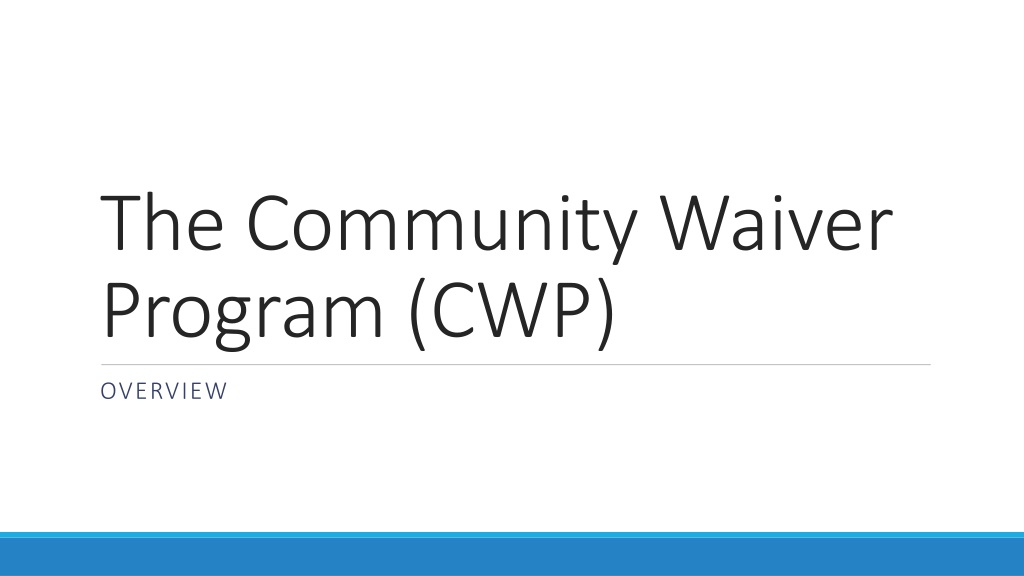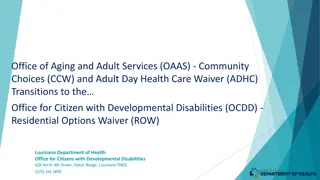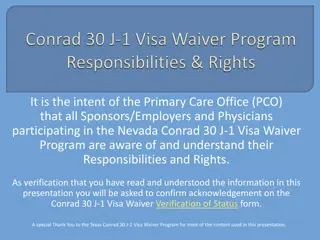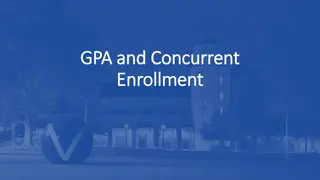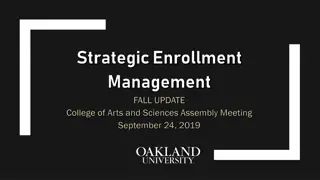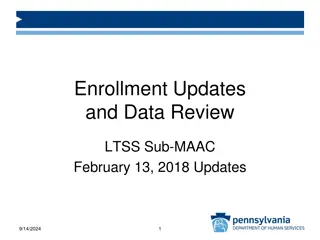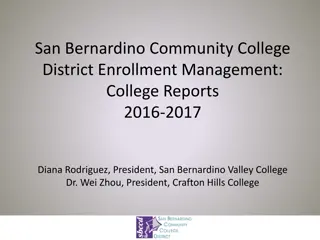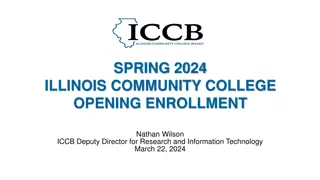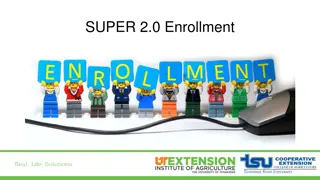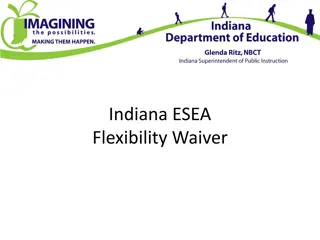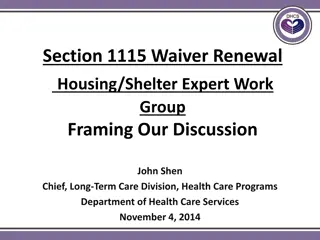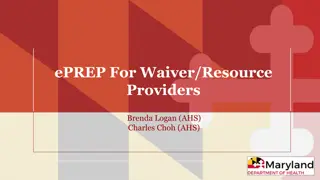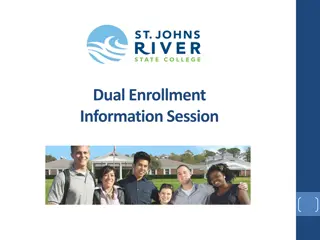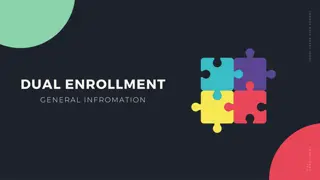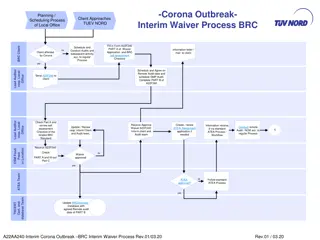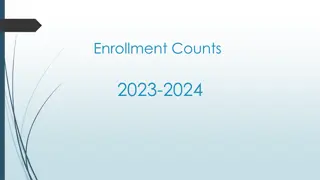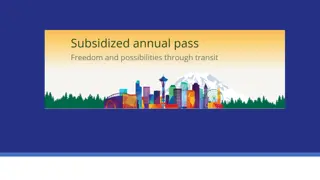Overview of the Community Waiver Program (CWP) and Enrollment Groups
The Community Waiver Program (CWP) aims to support full participation in communities, preserve natural living arrangements, and reduce waiting lists by offering targeted services to different enrollment groups. The program includes three authorities: 1915(c) Waiver, 1915(i) State Plan Amendment, and 1115 Demonstration Waiver. Enrollment groups cater to individuals with intellectual disabilities of different age groups and living situations, providing services aligned with their needs and eligibility criteria.
Download Presentation

Please find below an Image/Link to download the presentation.
The content on the website is provided AS IS for your information and personal use only. It may not be sold, licensed, or shared on other websites without obtaining consent from the author. Download presentation by click this link. If you encounter any issues during the download, it is possible that the publisher has removed the file from their server.
E N D
Presentation Transcript
The Community Waiver Program (CWP) OVERVIEW
CWP Overview Enrollments Begin: Outreach Begins: Goals: Support full participation in communities Preserve natural/existing living arrangements Reduce the Waiting List more rapidly April 1, 2021 December, 2020
CWP Overview Three Authorities 1915(c) Waiver Functions like ID/LAH Waivers 474 slots statewide (including reserve capacity) Identical Eligibility Criteria 1915(i) State Plan Amendment Purpose: to prevent at-risk persons from requiring 1915(c) services by providing supports in advance of need 26 slots statewide (including reserve capacity) Needs-based criteria, rather than eligibility criteria 1115 Demonstration Waiver Allows waiver of certain requirements of 1915(c) Waiver and 1915(i) State Plan Amendment Implement CWP only in Pilot Areas, rather than statewide Limit total enrollment capacity to align with financial resources Allow Support Coordination only by DMH staff (except Region 2, where provided by 310 Boards) Establish four distinct enrollment groups within the 1915(c) waiver, each with unique set of services and supports
1915(c) Waiver & Enrollment Groups EACH ENROLLMENT GROUP FEATURES A DISTINCT SET OF TARGETED SERVICES
1915(c) Waiver for Individuals with ID Meeting Institutional Level of Care Eligibility: Full scale IQ below 70 Age of onset of Intellectual Disability diagnosis before age 18 Significant functional limitations in three of six areas of adaptive functioning ICAP service score of 85 or lower Financial eligibility as determined by Medicaid: Assets: Up to $2000 Income: up to 300% of Federal Poverty Level
1915(c) Waiver Enrollment Groups 1. Children (ages 3-13) with ID who live with family or other natural supports 2. Transition-age youth (ages 14-21) who live with family or other natural supports or who (ages 18- 21) live independently 3. Working-age or older adults (ages 22+) with ID who live with family or other natural supports or who live independently 4. Persons (ages 3+) with ID who are unable to live with family or other natural supports or to live independently
Essential Family Preservation Supports Children (ages 3-13) with ID who live with family or other natural supports Support Coordination Personal Assistance Home; Personal Assistance - Community Independent Living Skills Training Community Transportation (Non-Medical) Positive Behavior Supports Breaks and Opportunities (Respite) Family Empowerment Counselor/Systems Navigator Services Natural Support or Caregiver Education & Training Financial Literacy & Benefits Counseling Services Assistive Technology & Adaptive Aids Minor Home Modifications
Seamless Transition to Adulthood Supports Transition-age youth who (ages 14-22) live with family or other natural supports or who (ages 18-22) live independently Support Coordination Employment Services (limited for ages 14-15) Personal Assistance Home; Personal Assistance - Community Independent Living Skills Training Community Transportation (Non-Medical) Positive Behavior Supports Breaks and Opportunities (Respite) Family Empowerment Counselor/Systems Navigator Services Natural Support or Caregiver Education & Training Peer Specialist Services Financial Literacy & Benefits Counseling Services Assistive Technology & Adaptive Aids Remote Supports Minor Home Modifications Supported Living Services (ages 18-22) Housing Counseling Services (ages 18-22) Housing Start-Up Assistance (ages 18-22) Skilled Nursing (age 22)
Family, Career & Community Life Supports Working-age or older adults (ages 22+) with ID who live with family or other natural supports or who live independently Support Coordination Employment Services Personal Assistance Home; Personal Assistance - Community Independent Living Skills Training Community Integration Connections & Skills Training Community Transportation (Non-Medical) Positive Behavior Supports Breaks and Opportunities (Respite) Family Empowerment Counselor/Systems Navigator Services Natural Support or Caregiver Education & Training Peer Specialist Services Financial Literacy & Benefits Counseling Services Assistive Technology & Adaptive Aids Remote Supports Minor Home Modifications Supported Living Services Housing Counseling Services Housing Start-Up Assistance Skilled Nursing Therapies Occupational, Physical, Speech & Language
Supports to Sustain Community Living Persons (ages 3+) with ID who are unable to live with family or other natural supports or to live independently Support Coordination Employment Services Personal Assistance Home; Personal Assistance - Community Independent Living Skills Training Community Integration Connections & Skills Training Community Transportation (Non-Medical) Positive Behavior Supports Peer Specialist Services Financial Literacy & Benefits Counseling Services Assistive Technology & Adaptive Aids Remote Supports Skilled Nursing Therapies Occupational, Physical, Speech & Language Adult Family Home Community-Based Residential Services
1915(i) State Plan TARGETED SERVICES TO SUPPORT INDEPENDENT COMMUNITY LIVING AND COMMUNITY INTEGRATION, INCLUDING EMPLOYMENT
1915(i) State Plan HCBS Program for Individuals with ID Meeting Needs-Based Eligibility Criteria (Non-Institutional Level of Care) Eligibility: Full scale IQ below 70 Age of onset of Intellectual Disability diagnosis before age 18 Significant functional limitations in a minimum one of four ICAP domains (score < 480) Age 22 or older Financial eligibility as determined by Medicaid: Assets: Up to $2000 Income: up to 150% of Federal Poverty Level or if working, up to 250% of Federal Poverty Level Only one enrollment group for 1915(i)
Community Waiver 1915(i) Working-age or older adults (ages 22+) with ID who live with family or other natural supports or who live independently Support Coordination Employment Services Independent Living Skills Training Community Integration Connections & Skills Training Community Transportation (Non-Medical) Peer Specialist Services Financial Literacy & Benefits Counseling Services Assistive Technology & Adaptive Aids Remote Supports Housing Counseling Services Housing Start-Up Assistance
Initial Allocation of Enrollment Slots: Note: State will have flexibility to move slots between all five groups to meet needs. State will move slots between regions only if needed to be sure all 500 slots (less reserve capacity) are filled in CY21 1915c Group #1 1915c Group #2 1915c Group #3 1915c Group #4 1915i TOTAL Age Range 3-13 14-21 22+ 3- No Max Age 22+ Statewide 30 70 300 74 26 500 Region 1 (Madison, Morgan, Limestone) 6 14 60 15 5 100 Region 2 (Tuscaloosa, Walker) 3 7 30 8 2 50 Region 3 (Baldwin, Mobile) 6 14 60 15 5 100 Region 4 (Montgomery, Elmore, Houston) 5 10 45 11 4 75 Region 5 (Jefferson) 10 25 105 25 10 175 Statewide Reserve Capacity (included in 500 slots) 0 0 0 51 6 57
Community Waiver Program Intake Process (from Waiting List) 1. People already on the Waiting List and within a Pilot Area are contacted by the corresponding RCS Waiting List Coordinator in order of the length of time they have been on the Waiting List (contact spreadsheet will be provided). 2. The Waiting List Coordinator explains the Community Waiver (call script will be provided) and offers enrollment and services if the person meets any of the priority enrollment criteria. 3. If they do not meet any of the priority enrollment criteria, the Waiting List Coordinator informs them they will be contacted again, if Community Waiver slots remain after those meeting the criteria and accepting services are served. 4. The Waiting List Coordinator verifies statutory and Medicaid eligibility for each person who met priority criteria and elected to receive services. 5. Record contact and outcome in ADIDIS Notes. 6. Record acceptance/rejection of offer and applicable enrollment priority criteria on WL contact spreadsheet. 7. AFTER CWP LAUNCH: The Waiting List Coordinator refers eligible enrollees to the Support Coordinator Supervisor for initiation of the enrollment process.
CWP Enrollment: Starting 2/1/2021 Six (6) Priority Categories Enrollment Priority Category #1: On waiting list, live in pilot area where this waiver is operating, age 22+ (no access to birth-to-three, public school/special education, EPSDT, ADRS pre-employment transition services); goal to preserve current family/independent living situation *and* goal to obtain/maintain competitive integrated employment if under age 65. Enrollment into 1915c Group #3 Enrollment Priority Category #2: On waiting list, live in pilot area where this waiver is operating, age 22+ (no access to birth-to-three, public school/special education, EPSDT, ADRS pre-employment transition services); goal to preserve current family/independent living situation. Enrollment into 1915c Group #3 Enrollment Priority Category #3: Not on waiting list but apply through ADMH/DDD, live in pilot area where this waiver is operating, age 22+ (no access to birth-to-three, public school/special education, EPSDT, ADRS pre-employment transition services); goal to preserve current family/independent living situation *and* goal to obtain/maintain competitive integrated employment if under age 65. Enrollment into 1915c Group #3 or 1915i Enrollment Priority Category #4: Not on waiting list but apply through ADMH/DDD, live in pilot area where this waiver is operating, age 22+ (no access to birth-to-three, public school/special education, EPSDT, ADRS pre-employment transition services); goal to preserve current family/independent living situation. Enrollment into 1915c Group #3 or 1915i Enrollment Priority Category #5: On waiting list; live in pilot area where this waiver is operating; transition age 16-21 (public education/special education, ADRS pre-employment transition services still available; EPSDT available until age 21); goal to preserve current family/independent living situation *and* goal to obtain/maintain competitive integrated employment at exit from high school. Enrollment into 1915c Group #2 Enrollment Priority Category #6: Not on waiting list but apply through ADMH/DDD; live in pilot area where this waiver is operating; transition age 16-21 (public education/special education, ADRS pre-employment transition services still available; EPSDT available until age 21); goal to preserve current family/independent living situation *and* goal to obtain/maintain competitive integrated employment at exit from high school. Enrollment into 1915c Group #2 (if meets institutional level of care)
Community Waiver Program Intake Process (from New Application) 1. The person seeking Waiver services (or a caregiver) contacts the Call Center to initiate application. 2. The Call Center: Completes the updated Initial Contact Form; Determines the home county (and Pilot Area, if applicable) Informs the person of the Waiver programs offered there; Notifies the corresponding RCS Waiting List Coordinator of the new application; Informs the person of eligibility information required; Receives eligibility documentation gathered/submitted by the person/their caregiver(s) and, when sufficient, transmits to the Waiting List Coordinator for review; 3. The Waiting List Coordinator verifies statutory and Medicaid eligibility for the person and assigns them to a Waiting List (either 1915(c) or 1915(i), as applicable). 4. The Waiting List Coordinator refers eligible enrollees to the Support Coordinator Supervisor for initiation of the enrollment process.
Community Waiver Program Services A BRIEF REVIEW
Support Coordination Support Coordination A case management role involving direct assistance with gaining access to waiver program services selected by the individual to meet one or more assessed needs. Provided by Support Coordinators employed by ADMH DDD. Comprehensive assessment of the individual, using both strengths and needs-based assessment tools. Coordination of Person-Centered Planning process consistent with HCBS Settings Rule. Monitoring of provision, adequacy, quality and effectiveness of Waiver services. At least one (1) face-to-face visit with the individual each month during the first year of enrollment and quarterly thereafter.
Personal Assistance Personal Assistance - -Home Home Designed to complement - but not supplant - natural supports and assist an individual with a disability to perform, in his/her home, activities of daily living that the individual would typically do for themselves if they did not have a disability. May be used to support the individual to prepare for competitive integrated employment (i.e. getting ready for work) and to be transported to the job. Includes assistance, support, or partial participation with eating, toileting, personal hygiene and grooming, dressing and other activities of daily living. Includes meal preparation, homemaker tasks, and home chore services, involving the waiver participant to the greatest extent possible. Using self-direction, this service can be provided by a natural caregiver(s) or relative(s) living in the same residence. Cannot also be the legal guardian/Medicaid representative for self-directed services. Maximum 972 units/month (50% of this 486 units if provided by natural caregiver(s)/relative(s)). Actual units authorized based on Personal Care Assessment results.
Personal Assistance Personal Assistance - -Community Community Designed to assist the individual to participate fully in the community by providing supports for activities of daily living that the individual would typically do for themselves if they did not have a disability. May be provided outside the home, at an integrated workplace, or other places in the broader community to support participation, involvement and contribution. Includes accompaniment, minor problem-solving, engagement with co-workers/members of the community, and development of positive/reciprocal relationships. Not available when another covered service is provided for which Personal Assistance Community is a component (e.g., Employment Supports, Respite, Community Integration Connections, Supported Living, Adult Family Home, Community-Based Residential, etc.). Does not include transportation to and from this service. Actual units authorized based on Personal Care Assessment results.
Community Transportation Community Transportation Transportation services offered in order to enable an individual to access the broader community, including competitive integrated workplaces and opportunities for integrated community participation. A natural or paid support-giver may accompany the person using Community Transportation, if the need for such supports are necessary and documented in the Person-Centered Plan. Never replaces natural supports available to the waiver participant but rather augments these natural supports, as needed, to ensure these natural supports can continue to be sustained over time. Whenever possible, family, neighbors, co-workers, carpools or friends are utilized to provide this assistance without charge, although the service allows for a flat per diem reimbursement in the event/on the occasion such supports are not available.
Breaks & Opportunities (Respite) Breaks & Opportunities (Respite) Services provided for time-limited periods when the family or other natural supports are temporarily unable to continue to provide support, care and supervision to the waiver participant. Provided in the waiver participant s home or the pre-approved private home of the provider. Provided during specific periods of time in a day, week or month when the unpaid family/natural support-givers typically provide support, care, and supervision. Limited to 30 days of service per person per calendar year (216 hours per person per calendar year). Can be provided in an unexpected situation (e.g., crisis), to allow time for assessment, planning, and intervention in order to prevent the loss of the family/natural support living arrangement.
Remote Supports Remote Supports Supports at the place of residence by Remote Support staff housed at a remote location and who are engaged with the person through equipment with the capability for live, two-way communication. Provided in real time, not via a recording, by awake staff at a remote monitoring base using the appropriate stable, reliable connection. Intended to address a person's assessed needs in his/her residence and are to be provided in a manner that promotes autonomy and minimizes dependence on paid support staff. The Remote Support staff shall have detailed and current written protocols for responding to a person's needs as specified in the PCP, including contact information for the backup support person(s) to provide assistance when necessary. A backup support person is always identified, available and responsible for responding.
Assistive Technology & Adaptive Aids Assistive Technology & Adaptive Aids Items used to increase, maintain, or improve functional capabilities and to support increased independence in the home, in community participation, and in competitive integrated employment. Covers purchases, leasing, shipping costs, and as necessary, repair of equipment. Must include evaluation of the needs of the individual by an appropriate professional, including functional assessment of the impact of provision of the service. Must include strategies for training the individual and their natural/unpaid and paid supporters. Examples: adaptive switches; adaptive equipment for feeding and oral hygiene; toileting equipment; communication devices; hearing/vision assistive devices; computer and other equipment to accommodate workplace participation; environmental control software.
Employment Supports Employment Supports Individual Individual A progression of services provided on an individual basis for a person who needs support in order to obtain/maintain an individualized, competitive or customized job in an integrated community setting. Exploration Discovery Job Development Plan Job Development Job Coaching Career Advancement
Employment Supports Employment Supports Individual Exploration Exploration Individual A service designed to help a person make an informed choice about whether they wish to pursue an individualized, competitive or customized job in an integrated community setting. Limited to no more than thirty (30) calendar days from the date of service initiation. Not appropriate for persons who know they want to pursue an individualized, competitive or customized job in an integrated community setting. Includes introductory activities to identify a person's areas of specific interest, experience and skill related to individualized, integrated employment. Includes exploration of employment opportunities that are specifically related to the person's identified interests, experiences and/or skills through at least three uniquely arranged business tours, informational interviews and/or job shadows. Includes introductory, basic education on the numerous work incentives for SSI and/or SSDI beneficiaries and how Supported Employment services work (including Vocational Rehabilitation services).
Employment Supports Employment Supports Individual Discovery Discovery Individual A service designed to help a person, who wishes to pursue an individualized, competitive or customized job in an integrated community setting, to identify through person-centered assessment, planning, and exploration: Strong interests toward one or more specific aspects of the labor market. Skills, strengths and other contributions likely to be valuable to employers. Conditions necessary for successful employment. May involve a comprehensive analysis of the person's history, interviews with family, friends and support staff, observing the person performing work skills, and career research. May involve the writing of a Profile specific in order to provide a valid assessment for Vocational Rehabilitation (VR) services to begin, which would begin with the development of an Employment Plan through ADRS. Limited to no more than sixty (60) calendar days from the date of service initiation.
Employment Supports Employment Supports Individual Job Development Plan Job Development Plan Individual A service designed to create a clear plan for Job Development to obtain an individualized, competitive or customized job in an integrated community setting. Limited to thirty (30) calendar days from the date of service initiation. Includes a planning meeting involving the person and other key people who will be instrumental in supporting the person to become employed. Culminates in a written plan directly tied to the results of Exploration and/or Discovery, as applicable when previously authorized.
Employment Supports Employment Supports Individual Job Development Job Development Individual A service that is designed to implement the Job Development Plan, if applicable, and should result in the achievement of an individualized, integrated employment outcome consistent with the person's employment and career goals, as determined through Exploration, Discovery, and/or the employment planning process. Should reflect best practices and whether the person is seeking competitive or customized employment. Paid on an outcome basis once an individualized, competitive or customized job has commenced, with payment tiered based upon the person's level of disability (as evidenced by ICAP score).
Employment Supports Employment Supports Individual Job Coaching Job Coaching Individual A service that includes supports provided to the person and their supervisor or co-workers, either remotely (via technology) or face-to-face. Job Coaching supports must be guided by a Job Coaching fading plan. Must include systematic instruction utilizing task analysis to teach the person to independently complete as much of their job duties as possible. Examples of Job Coaching strategies: job analysis, job adaptations, instructional prompts, verbal instruction, self-management tools, physical assistance, role play, co-worker modeling, and written instruction. Must include the engagement of natural supports in the workplace (e.g., employers, supervisors, co- workers, or volunteers at the job site; or friends or family members in supportive roles). Not time-limited. The amount of time authorized for this service is a percentage of the person's hours worked, based on individual need. This service cannot include payment for the supervisory and co-worker activities rendered as a normal part of the business setting.
Employment Supports Employment Supports Individual Career Advancement Career Advancement Individual A service that includes supports for persons currently engaged in individualized, integrated employment who wish to obtain a promotion and/or a second individualized, integrated employment opportunity. Focuses on developing and successfully implementing a plan for achieving increased income and economic self-sufficiency through promotion to a higher paying position or through a second individualized, integrated employment or self-employment opportunity. Outcomes of this service are: The identification of the person s specific career advancement objective. Development of a viable plan to achieve this objective. Implementation of the plan which results in the person successfully achieving his/her specific career advancement objective. May not be included on a PCP if it also includes any of the services covered under Supported Employment - Individual Employment Supports, except Job Coaching.
Employment Supports Employment Supports Small Group Small Group A service and training activities to support successful transition to individualized integrated employment or self-employment, or to supplement such employment and/or self-employment when it is only part-time. The service may include: Small group career planning and Exploration Small group Discovery classes/activities Other educational opportunities related to successful job acquisition and working successfully in individualized integrated employment Employment in integrated business, industry and community settings Examples include mobile crews, small enclaves and other small groups participating in integrated employment. The maximum group size for mobile crews and enclaves is four (4). The expected outcome is the acquisition of knowledge, skills and experiences that facilitate career development and transition to individualized integrated employment or self-employment.
Employment Supports Employment Supports Co Co- -Worker Supports Worker Supports A service that allows a co-worker to offer supports in the workplace in lieu of a job coach. The provider enters into an agreement with the employer to reimburse the employer for the service of the co-worker acting in lieu of a job coach. Can be used when an employer wants to hire an individual but has reasons for not wanting an external job coach in the workplace. Authorized on a time-limited basis (no longer than 180 days) and reviewed to determine need for renewal/continuation. Actual amount of Co-Worker Supports authorized is based on individual need as determined through an on-the-job support assessment.
Integrated Employment Path Services Integrated Employment Path Services A service that provides time-limited learning and work experiences, including volunteering opportunities, where a person can develop general, non-job-task-specific strengths and skills that contribute to employability. Specifically involve strategies that facilitate a participant's successful transition to individualized integrated employment or self-employment. Limited to no more than one year. One extension of up to one year can be allowed only if the person is actively pursuing employment and has documentation that a service (i.e., ADRS Individualized Plan for Employment, Job Development, etc.) is concurrently authorized for this purpose. The one-year extension may be repeated only if a person loses employment and is seeking replacement opportunities. Shall not be provided or reimbursed if the person is receiving Job Coaching, Co-Worker Supports, or is working in individualized integrated employment.
Community Integration Connections and Community Integration Connections and Skills Training Skills Training Time-limited services which identify and arrange integrated opportunities for the person to achieve his/her unique goals for community participation, involvement, membership, contribution and connections. Includes targeted education and training for specific skill development to enable the waiver participant to develop ability to independently (or with natural supports only) engage in these integrated opportunities. Provided in a variety of integrated community settings that offer opportunities for the person to achieve their personally identified goals for community participation, involvement, membership, contribution and connections, including developing and sustaining a network of positive natural supports. The provider must prepare and follow a plan utilizing systematic instruction and other evidence-based strategies for teaching the specific skills identified in the Person-Centered Plan.
Independent Living Skills Training Independent Living Skills Training Time-limited, focused service that provides targeted education and training for specific skill development to enable the waiver participant to develop the ability to independently perform routine daily activities at home. Not intended to provide substitute task performance by staff. The provider must prepare and follow a plan utilizing systematic instruction and other evidence-based strategies for teaching the specific skills identified in the Person-Centered Plan. Parents and/or other natural supports in the home will be encouraged to observe the training so they can learn how to use the instructional strategies, reinforce the learned skills and contribute to ensuring the maintenance of these skills after the service ends. The provider must document weekly progress toward achieving each independent living skill identified in the Person-Centered Plan. Provided in the home of the person supported.
Peer Specialist Services Peer Specialist Services A service that assists a person to develop and utilize skills and knowledge for self-determination in one or more of the following areas: Directing the person-centered planning (PCP) process; Understanding and considering self-direction; Understanding and considering individualized integrated employment/self-employment; ands Understanding and considering independent and supported living community living options. Provided by a peer with intellectual or developmental disabilities who has experience matched to the focus area, needs and goals of the person receiving this service: Has successfully directed their own Person-Centered Planning process. Has self-directed their own services. Has successfully obtained individualized integrated employment at a competitive wage. Utilizes independent/supported living options.
Family Empowerment Counselor and Family Empowerment Counselor and Systems Navigator Services Systems Navigator Services A service that matches the involved family members (e.g. support/care givers; legal guardians) of an individual with intellectual disabilities with a local professional or similar reputable adult with broad knowledge of the variety of programs and local community resources available. Involve assessment of the individual s situation (including needs, goals), assessment of the family s specific goals and needs for information, assistance, and referral to address the individual and family s situation. The goal of the service is to empower the family with the information, connections and referrals they need, and to work with the family to increase their skills in problem-solving and leveraging available programs and community resources. May facilitate an opportunity for interested family members, who have received this service, to become providers of this service themselves.
Natural Caregiver Education and Training Natural Caregiver Education and Training This service provides reimbursement up to $500 per year to offset the costs of educational materials, training programs, workshops, conferences and other similar opportunities that help a family caregiver or other vital, unpaid care and support giver for a waiver participant to: Understand the disability of the person supported; Achieve greater competence and confidence in providing supports; Access community and other resources and supports; Develop strong advocacy skills; and Support the person in developing and using self-advocacy skills. Provides education and support to the care/support giver that preserves the family unit and/or involvement of a similar unpaid, care and support giver for the person. Increases the confidence, stamina and resourcefulness of the family caregiver or similar care and support giver in the person s life.
Financial Literacy and Work Incentives Financial Literacy and Work Incentives Benefits Counseling Benefits Counseling Service designed to improve economic self-sufficiency necessary to continue to provide a home and/or natural support to a person enrolled in the waiver. Also intended to assist with evaluating financial health and current level of financial literacy, and making a plan with specific strategies to improve financial health and increase level of financial literacy. Financial Literacy services are specifically for waiver participants sixteen (16) and older who are living independently or in a supported living arrangement. For Financial Literacy services, there must be a documented and current concern about the ability to sustain the family home or the person s home. Work Incentive Benefits Counseling is designed to provide general introductory education that identifies pathways to ensuring individualized integrated competitive employment and to provide a thorough Work Incentive Benefits Analysis addressing benefits, entitlements, subsidies, and services received to assess any impact on these by employment income. Assistance with development of a PASS Plan or IRWE is limited to a total of fifteen (15) hours of service covering all necessary steps involved for submission to, and approval by, the Social Security Administration.
Positive Behavior Supports Positive Behavior Supports Services designed to improve the ability of unpaid natural supports and paid direct support staff to carry out therapeutic behavioral interventions. As needed, providers of Positive Behavior Supports conduct assessments, develop a person s behavior support plan and train/consult with unpaid caregivers and/or paid support staff who are implementing the person s behavior support plan. Includes: Assessment to inform the development of behavior support plans for settings where needed (home; work; community), including methods for evaluating effectiveness. Development of a home and/or community and/or worksite behavior support plan and/or intervention plan. Training and technical assistance to carry out the behavior support plan and monitoring of the person and the natural support/staff in the implementation of the plans. The provider will identify training needs and outline a training plan for staff/unpaid caregivers. Limited to no more than 480 units per year. Positive Behavior Supports Specialist Five (5) years experience in ID (two (2) years professional experience addressing challenging behaviors), plus BA/BS in a human services field and training in behavior supports, behavioral psychology and/or applied behavioral science.
Minor Home Modifications Minor Home Modifications Modifications to the home, required by the individual s PCP, which are necessary to ensure the health, welfare, and safety of the individual, or which enable the individual to function with greater independence in the home. Such modifications include: Provision and installation of certain home mobility aids, including a wheelchair ramp, handrails for interior or exterior stairs/steps, and grab bars. Minor physical adaptations to the interior of a residence which are necessary to ensure the health, welfare and safety of the individual, or which increase the individual s mobility and accessibility within the residence, including widening of doorways, modification of bathrooms, installation of electric and plumbing systems necessary to accommodate any needs of the individual. Adaptations that add to the total square footage of the home are excluded from this benefit. Limited to $5,000 per waiver year.
Housing Counseling Services Housing Counseling Services Services which provide assistance to a person when acquiring housing in the community, where ownership or rental of housing is separate from service provision. Promotes consumer choice and control of housing and access to housing that is affordable, accessible to the extent needed by the individual, and promotes community inclusion. Includes counseling and assistance, based on individual needs and a plan reflecting these needs, in a variety of areas: Exploring both home ownership and rental options; Exploring both individual and shared housing situations; Identifying financial resources and determining affordability; Identifying how earned income, or an increase in earned income, could impact choice, access and affordability of housing options Identifying preferences of location and type of housing; Identifying accessibility and modification needs; Identifying and assisting with access to financing if homeownership is goal; Identifying and assistant with access to rental subsidies if renting is goal.
Housing Start Housing Start- -Up Assistance Up Assistance A service intended to provide essential services and items needed to establish an integrated community living arrangement for persons relocating from an institution, a provider owned or controlled residential setting, or a home owned or controlled by another individual. Assistance is intended to enable the person to establish an independent or supported living arrangement. Allowable costs include: Deposit required for a leased or rented living arrangement; Initial fees and/or deposits to establish utility service for water, heat, electricity, phone; Purchase of basic and essential items needed to establish a safe and secure home; Moving costs May also include person-specific services and supports that may be arranged, scheduled, contracted or purchased, which support the person s successful transition to a safe, accessible independent or supported living situation.
Supported Living Services Supported Living Services Services that include training and assistance in maintaining a home of one s own: a residence not owned or controlled by a waiver service provider or a residence that is not the home of a family caregiver. The home may be shared with other freely chosen housemates who may or may not also receive waiver services and/or have a disability. Provided with the goal of maximizing the person s independence and interdependence with housemates and natural supports, using a combination of teaching, training, technology and facilitation of natural supports. Intended for persons who, with technology, natural supports and good advanced planning, need intermittent and/or on-call staff support to remain in their own home and who do not need and will not benefit from around-the-clock staffing. 24-hour on-call access to supports on an as-needed/emergency basis. It is the responsibility of the provider to ensure that the person has an emergency preparedness plan in place at all times.
Adult Family Home Adult Family Home A community-based alternative to residential habilitation service that enables up to three persons receiving this service to live in the home of trained host family caregivers (other than the person s own family) in an adult foster care arrangement. In this type of shared living arrangement, the person(s) moves into the host family s home, enabling the person(s) to become part of the family, sharing in the experiences of a family, while the trained family members provide the individualized services that: Support each person s independence and full integration in their community; Ensure each person s choice and rights; and Support each person in a manner that complies fully with HCBS Settings Rule standards, including standards for provider-owned or controlled homes. Services are individualized based on the needs of each person.
Community Community- -Based Residential Services Based Residential Services Services that enable an individual to avoid institutionalization and live in a community setting that provides services to: Support the person s maximum independence, autonomy and full integration in their community. Ensure each person s rights and abilities to make choices. Support each person in a manner that complies fully with HCBS Settings Rule standards, including standards for provider-owned or controlled homes. The setting in which the service is provided must be an ADMH-certified, community-based residential setting which supports each person s independence and full integration into the community and ensures each person s basic needs. Provided for up to four individuals in a dwelling which may be rented, leased, or owned by the provider. The person has the right to a legally enforceable lease or rental agreement with the provider that offers the same appeal rights and eviction protections as is required under state landlord-tenant law. Family members (i.e., parents, grandparent, siblings, children, or spouse, whether the relationship is by blood, marriage or adoption) are not eligible providers.
Physical Therapy Physical Therapy Treatment of an individual by physical measures and the use of therapeutic exercises and rehabilitative procedures for the purpose of preventing, correcting, or alleviating a physical or mental disability. Requires a physician's prescription and documentation in the form of an initial evaluation and development of a treatment plan with established goals. Services must begin with the PT evaluation that, if necessary, results in the development of a treatment plan. The treatment plan should outline the frequency of service, goals of therapy, and outcomes or milestones to be reached by the participant. Expected to recommend exercises to the participant and his/her natural/paid direct support providers that will be completed at home. Should teach the primary natural/paid direct support providers how to continue all relevant exercises that can be done at home. Limited to no more than 50 hours or 200 units annually and no more than one session a week.
Occupational Therapy Occupational Therapy The application of occupation-oriented or goal-oriented activity to achieve optimum functioning, to prevent dysfunction, and to promote health. Requires a physician's prescription and documentation in the form of an initial evaluation and development of a treatment plan with established goals. Services must begin with the evaluation that, if necessary, results in the development of a treatment plan. The treatment plan should outline the frequency of service, goals of therapy, and outcomes or milestones to be reached by the participant. Expected to recommend exercises to the participant and his/her natural/paid direct support providers that will be completed at home. Should teach the primary natural/paid direct support providers how to continue all relevant exercises that can be done at home. Limited to no more than 50 hours or 200 units annually and no more than one session a week.
